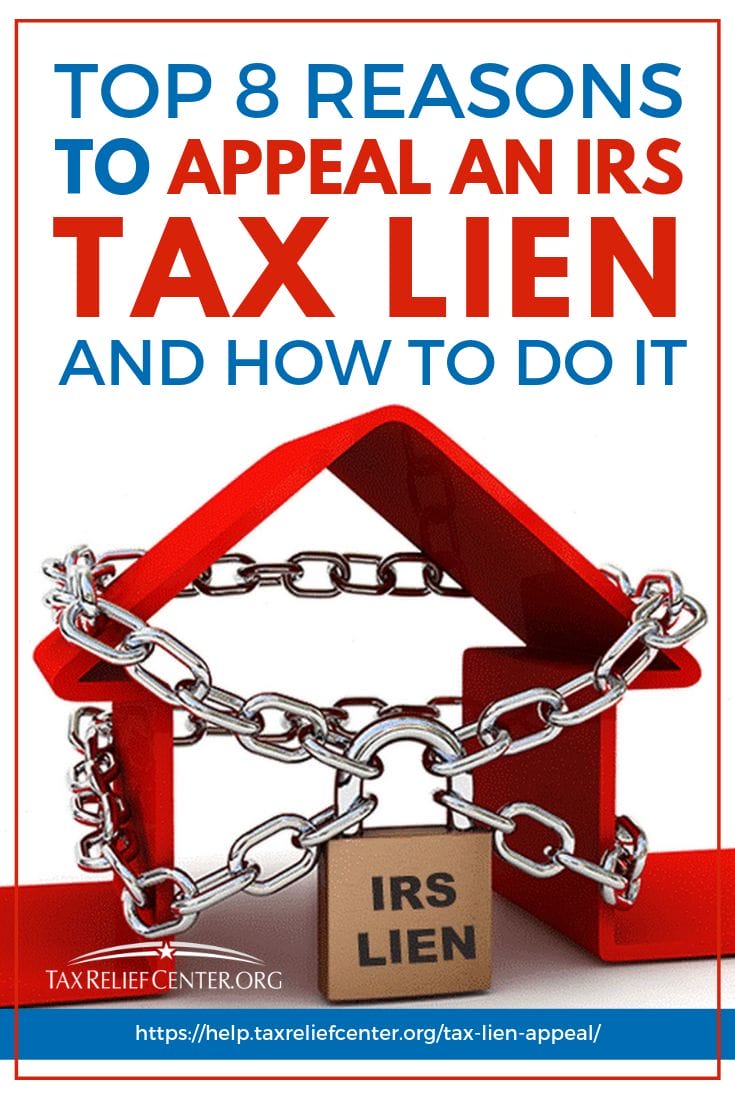The IRS will overturn a Notice of Federal Tax Lien if you have a legitimate case against it — but you must follow the right dispute procedure.
RELATED: 5 Easy Ways To Avoid An IRS Tax Lien
In this article:
- You Already Paid the Taxes in Full
- Tax Lien Filing Error
- You Are in the Process of Filing Bankruptcy
- Expiration of the Statute of Limitations Prior to Tax Lien Filing
- The IRS Failed to Allow Dispute of Tax Return Evaluation
- Tax Lien Mistakenly Filed Against Your Name
- You Are in the Process of Applying for Innocent Spouse Relief
- You Want to Explore Available Tax Relief Options
When and How to Appeal an IRS Tax Lien
1. You Already Paid the Taxes in Full
The IRS runs multiple offices, each tasked with specific responsibilities. Sometimes, communication failure occurs between these offices, resulting in a procedural mix-up.
If you already paid your back taxes in full and have the right documents to support your claim, do not hesitate to contest a Notice of Federal Tax Lien. It might just be an honest mistake which can easily be resolved.
2. Tax Lien Filing Error
The IRS ideally follows a clear cut procedure when undertaking its functions. The omission of certain steps in these procedures is enough reason for a taxpayer to contest the legitimacy of any endeavor initiated by the agency.
For example, the IRS should provide you with a notice of demand for payment if you have outstanding back taxes. A tax lien can only be filed if you failed to comply or respond to the aforementioned notice within 10 days of receipt.
If you did not receive any notice of demand for payment, the process proves problematic, and therefore, questionable.
3. You Are in the Process of Filing Bankruptcy

Filing for bankruptcy allows a debtor “automatic stay.” This is legally mandated by the United States’ Bankruptcy Code (Section 362).
Tax liens qualify as a legitimate debt collection effort and can, therefore, be appealed.
Automatic Stay Definition: This means debt collection efforts are temporarily ceased.
4. Expiration of the Statute of Limitations Prior to Tax Lien Filing
The IRS can collect a debt 10 years from the date of a tax return evaluation. This period constitutes the statute of limitations covering tax debt.
As soon as this 10-year period expires, your outstanding tax debt becomes void. A tax lien received after the expiration of statutes of limitations can usually be overturned, except for certain cases.
5. The IRS Failed to Allow Dispute of Tax Return Evaluation
The IRS is allowed five business days after filing a tax lien to inform a taxpayer about the decision. This is by way of a “Notice of Federal Tax Lien and Your Right to a Collection Due Process Hearing.”
In turn, a taxpayer has 30 days to appeal the tax lien notice. If you did not receive the aforementioned notice, you have the right to contest the tax lien imposed upon your property.
6. Tax Lien Mistakenly Filed Against Your Name
Mistakenly-filed tax liens happen. In fact, these errors run rampant, according to a Treasury Inspector General for Tax Administration report.
One of the more common reasons for these errors is mixing up taxpayer details. For instance, an IRS agent might confuse you for your namesake, which can lead to you getting someone else’s tax lien notice.
7. You Are in the Process of Applying for Innocent Spouse Relief

For married couples filing joint tax returns, there is a way out if you are served a tax lien. That is if you qualify for the Innocent Spouse Relief.
Innocent Spouse Relief provides you tax lien reprieve. For eligibility, you must furnish the IRS with sufficient evidence that you are not in any way knowledgeable of tax understatement committed by your spouse.
8. You Want to Explore Available Tax Relief Options
If you are in the process of looking into available tax relief options, you can appeal a tax lien from the IRS. Whether you choose to apply for Offer in Compromise or agree on a new installment payment plan, the IRS should be able to reassess the tax lien filed against your property.
RELATED: IRS Levy: The Difference Between Tax Liens And Tax Levies
Applying for a Tax Lien
Now that you’ve read up on the various reasons you might be eligible for a tax lien, here’s a basic step-by-step process on how to apply for one.
Step 1. Request a Hearing (Collection Due Process VS Collection Appeals Program)
Upon receipt of a contestable tax lien notice from the IRS, you must provide the agency a hearing request within 30 days. You can choose either a Collection Due Process (CDP) or a Collection Appeals Program (CAP) hearing.
A Collection Due Process hearing best suits taxpayers issued with IRS Letter 3172 or “Notice of Federal Tax Lien and Filing and Your Right to a Hearing Under IRC 6320.” CDP hearings may be requested via a written letter or completion of IRS Form 12153.
Meanwhile, a Collection Appeals Program (CAP) hearing may be requested both after and before tax lien filing. This means you can preemptively question a tax lien in the works against your account.
Also, a CAP hearing allows taxpayers to contest dismissal of a tax lien appeal. Although the CAP hearing proves faster and more comprehensive compared to other types of tax appeal procedures, it has its downsides.
With a CAP hearing, you cannot question the amount of your outstanding tax debt. Moreover, you cannot take your case to the U.S. Tax Court if you end up with an unfavorable verdict.
Failure to file a hearing request within the 30-day period should not dissuade you from making an IRS appeal. You still have the “equivalent hearing” option, which you can also file via Form 12153.
Step 2. Specify Your Request
In your written hearing request or accomplished Form 12153, you must clearly specify your desired IRS appeal outcome. Appealing an IRS tax lien can yield any of these three results, depending on your request.
- Withdrawal: Complete removal of an IRS tax lien from the public record and your credit report.
- Discharge: Release of an IRS tax lien from certain property.
- Subordination: Permitting existing liens from other creditors priority.
It pays to approach this choice strategically. Make sure to stay practical and request a verdict which you think is most plausible, given your specific case.
Your hearing request should clearly state your reasons for contesting the IRS tax lien. Moreover, it should specify tax relief options you wish to qualify for, such as Offer in Compromise, Installment Payment Agreement, or Innocent Spouse Relief.
Step 3. Prepare Your Documents

Once the IRS receives your written request or Form 12153, you will be contacted by the agency for scheduling. Consequent meetings happen by mail, over the phone, or face-to-face, depending on the discretion of the IRS.
During this evaluation period, you must be prepared with all pertinent records. These include a copy of your tax return in question, as well as other documents such as tax deductions, mortgages, and other relevant expenses.
The IRS will provide you with a determination letter after your case hearing. If the IRS Office of Appeals denied your request, you can take your case to the U.S. Tax Court.
You must file your petition with the U.S. Tax Court within 30 days upon receipt of the determination letter from the IRS Office of Appeals.
Step 4. Get Professional Representation
When appealing an IRS tax lien through any of the relevant hearing procedures, it is best to have professional representation by your side. This will allow you peace of mind.
A tax expert will articulate your case to IRS authorities in as clear a manner as possible. For this purpose, you can hire the services of a Certified Public Accountant (CPA), a tax attorney, or an enrolled agent.
Whichever tax professional you choose, make sure you two thoroughly discuss your case before appearing in your scheduled IRS meetings. Being on the same page with your hired tax expert is crucial.
An IRS tax lien is the agency’s way to secure the tax debt you presumably owe. However, there are legal options you can follow to dispute the decision if you believe you have been wrongfully served a Notice of Federal Tax Lien.
So, as long as you abide by the agency’s procedure, you can rest assured an IRS tax lien can be overturned.
Do you have any questions regarding tax liens and levies? Please do not hesitate to share them in the comments section below.
If you owe back taxes, visit taxreliefcenter.org for more information on tax relief options.
Up Next:
- 9 Most Common Types Of Tax Liens
- Tax Penalty Abatement | What Is It And How To Do It
- A Guide To Available IRS Tax Payment Options


